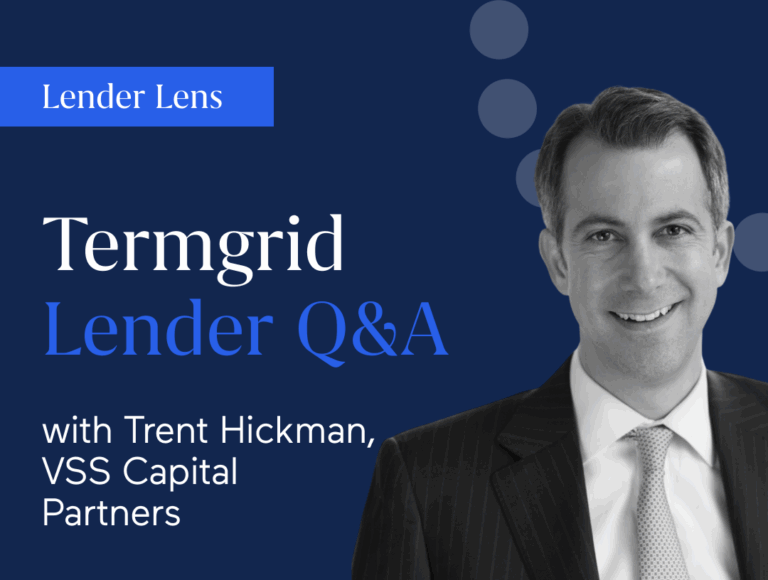Welcome to Lender Lens, our series for profiling leaders in the Lender community.
With private credit playing an increasingly important role in the financial system, we wanted to find out how lenders are navigating the evolving landscape and how they assess the market in the coming years.
As private credit grows more competitive, Northleaf Capital Partners stands out with a relationship-driven approach rooted in its long-standing private equity platform.
We spoke with Brett Lauber, Managing Director at the firm, about how Northleaf sources proprietary mid-market opportunities, navigates shifting sector dynamics, and leans into complex asset classes like music royalties and litigation finance.
Brett also shared the principles that guide his decision-making through volatile markets, and what he enjoys most about life and work in Chicago, where he’s built both a career and a home over the past two decades.

What differentiates Northleaf’s approach to mid-market private credit from other managers in the $1B+ AUM range?
Northleaf is a global private markets investment firm focused exclusively on middle-market infrastructure, private equity, and private credit. What sets us apart is the integrated nature of our credit platform and the synergistic relationship with our private equity businesses.
Our private equity team has been investing alongside private equity managers since the early 1990s via primaries, secondaries, co-investments, and structured capital. Our private credit platform leverages these long-term relationships, which provides us with proprietary access to financing opportunities across GP portfolios. We also have an information advantage given that we have already underwritten the GP’s track record and also have strong visibility into their underlying portfolios, enabling us to move quickly with greater conviction.
How do you define your target borrower profile in terms of EBITDA, sector, and geography?
Northleaf’s private credit program focuses on mid-market corporate direct lending and asset-based specialty finance investments across North America (~70%), Western Europe/the UK (~25%) and Australia (~5%).
Within Northleaf’s corporate direct lending strategy, we focus on mid-market, private equity-owned businesses, typically with $10-$50M of EBITDA at entry. Our approach emphasizes “targeted diversification”, where we avoid sectors that tend to underperform in recessionary environments, including consumer discretionary, storefront retail, travel & leisure, hotels, gaming, restaurants, commodity-exposed businesses, or highly capital-intensive or cyclical sectors. In the sectors where we do invest, we look for businesses that have recurring revenues and sticky products and services, which drive stable cash flows.
Are there specific industries or deal types you’re actively leaning into or avoiding right now?
At the moment, we are seeing some margin pressure within the healthcare services space, so we’re highly selective with new investments in this space. And while we avoid consumer discretionary businesses, we are also more selective on the non-discretionary consumer segment given the current market backdrop. In contrast, we’re seeing strong performance in MRO (maintenance, repair, overhaul) industrial services, financials, and IT services – areas we’ve been increasingly allocating to over the last ~18 months.
Another area of focus is asset-based specialty finance, where we continue to see strong relative value. We are focused on niche corners of specialty finance that have minimal correlation to the overall macro economy, offer good downside protection, and generate a premium as a result of the complexity. This includes music royalties, commercial litigation finance, healthcare receivables, and specialized factoring platforms.
As competition in the mid-market intensifies, what do you see as Northleaf’s key strengths in continuing to win attractive deals?
The middle market is heavily relationship-oriented, and so being a preferred financing partner to PE sponsors across equity and debt financing is a big differentiator. Our PE team’s fund investments provide us with early access as well as the last look on many financing opportunities – a significant advantage as competition intensifies.
In addition, it’s also critical to stay relevant in any market environment by being able to provide borrowers with flexible capital solutions. When M&A volumes decline, we see an increase in CV transactions, the use of Holdco PIK or preferred equity, and NAV loans. Our ability to invest across the capital structure and provide different capital solutions allows us to be a valued financing provider and find attractive relative value in any given market.
What’s a decision-making principle or habit that’s helped guide you through volatile markets?
It’s important to stay disciplined and stick to the key principles of your investment philosophy. That’s even more important when markets make it more difficult to do so. Many managers can be tempted to make exceptions when markets are slow and start to rationalize those deviations, so ensuring the decision-making framework remains objective is critical, and this consistency in our strategy is something our investors value. When it comes to investing in our illiquid market, it’s always better to lose out on an investment opportunity that we were chasing than to make a bad investment that we have to hold for the long term.
What do you enjoy most about being based in Chicago — professionally or personally?
From a personal perspective, Chicago is a great place to live. I’ve been here for over 20 years, and I currently live in the city with my wife and three kids. Chicago is more affordable than the coasts, has great architecture, amazing (fresh water) beaches, is very walkable, and has great restaurants. From a professional perspective, it’s obviously a big capital markets hub, but what I really love is that you can do a day trip to anywhere in the country.
Stay in touch with all of our latest updates and articles. Sign up now.



